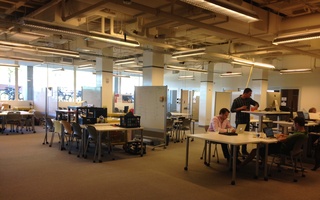UPDATED: February 4, 2016, at 12:24 p.m.
The whir of centrifuges may blend with the noise of chattering keyboards and buzzing work rooms when the Harvard Life Lab, a biotechnology research and entrepreneurial facility, is slated to open this fall in Allston.
Pending approval by the City of Boston, the proposed Life Lab will feature 36 lab benches, fume hoods, tissue culture and microscopy facilities, a private faculty-in-residence lab suite, conference rooms, and co-working spaces to support team planning. The two-story, 15,000-square-foot facility is slated for construction on Western Ave., in the parking lot directly west of the four-year old affiliated i-lab. {shortcode-544bd397b755bec558af639a37637823dd4137af}
Jodi Goldstein, the i-lab’s managing director, said the Life Lab will be an interim facility, expected to operate for the next five to 10 years before moving to a more permanent location.
“We look at this as a prototype of sorts, as a way to inform the future development of this Allston research and science community,” Goldstein said.
Goldstein said the lack of space and resources for life science ventures has been a conspicuous deficiency among Harvard affiliates interested in enterprise.
“It’s been a pain point of mine when we do have students in this area, we can’t offer them the wet lab resources to replicate and demonstrate their science, which slows them down,” she said.
Previously, life science startups based in the i-lab hired research organizations or academic labs to perform their research. Contracting out lab work is prohibitively expensive for companies in the early stages of development, according to Michael A. Schrader, a 2012 Harvard Business School graduate and the CEO of Vaxess Technologies, a startup founded at the i-lab. Vaxess uses silk proteins to develop vaccines that do not need to be refrigerated.
During its tenure in the i-lab, Vaxess often had to outsource lab-based research, Schrader said. He said outsourcing both cost the company money and lowered the quality of lab work.
“I can’t even imagine, had [Vaxess] been able to have that kind of infrastructure available two years earlier, I think we’d be at least a year to a year and a half farther ahead in the development of the technology,” he said.
If approved by the Boston Redevelopment Authority, Boston’s urban planning agency, the Life Lab will join the i-lab and the alumni-focused Harvard Innovation Launch Lab opened in 2014 as the third fixture of Harvard’s expanding entrepreneurial network in Allston. Harvard first presented plans for the Life Lab to the BRA at a public meeting in October.
“The way I think about it is the i-lab is the platform for all of this One Harvard, cross-disciplinary approach to occur,” Goldstein said, referencing Drew G. Faust’s “One Harvard” initiative.
The Life Lab will sponsor STEM workshops for local residents as part of the community benefits that now commonly accompany Harvard projects in Allston. Goldstein said the workshops are a result of input from the Harvard-Allston Task Force, a neighborhood advisory body to the BRA on the University’s Allston plans.
Schrader said he believes that the Life Lab could be “game-changing,” allowing life science ventures to perform their own lab work while remaining in close proximity to the i-lab’s network of startups.
“[The Life Lab] really gets me excited about the future for the Allston development,” Goldstein said.
This article has been revised to reflect the following clarification:
CLARIFICATION: February 4, 2016
An earlier version of this article indicated a new biotechnology lab would open in Allston in September. To clarify, the lab is scheduled to open sometime in the fall.
–Staff writer Jonah S. Lefkoe can be reached at jonah.lefkoe@thecrimson.com. Follow him on Twitter @JonahLefkoe.
–Staff writer Hannah Natanson can be reached at hannah.natanson@thecrimson.com. Follow her on Twitter @hannah_natanson.Read more in News
Allstonians Frustrated with New Location of MeetingsRecommended Articles
-
Harvard Taps Gordon Jones as Director of Innovation LabGordon S. Jones, a businessman and Harvard Business School admissions officer, has been selected as the inaugural director of the Business School’s Innovation Lab in Allston.
-
 Innovation Lab Looks to Help Start-Ups
Innovation Lab Looks to Help Start-Ups -
 Jodi Goldstein Tapped To Lead I-Lab
Jodi Goldstein Tapped To Lead I-Lab -
 First 11 Biotech Startups Admitted to Harvard’s Life Lab
First 11 Biotech Startups Admitted to Harvard’s Life Lab -
 i-lab Launches New Alumni-Led Ventures Program
i-lab Launches New Alumni-Led Ventures Program












